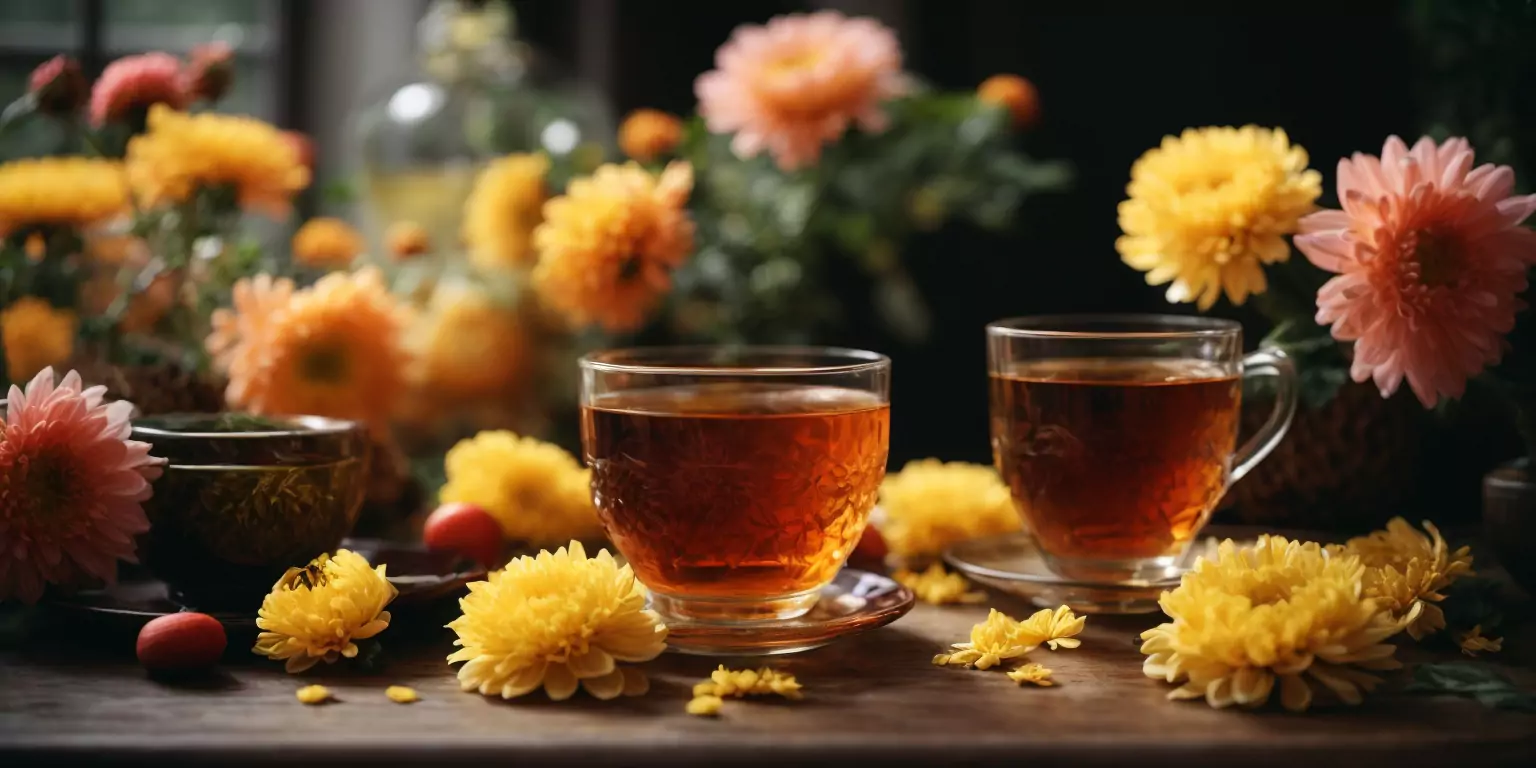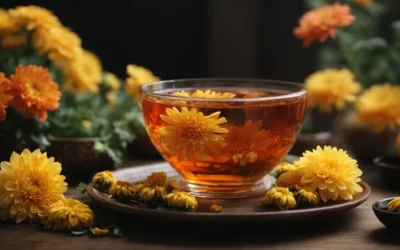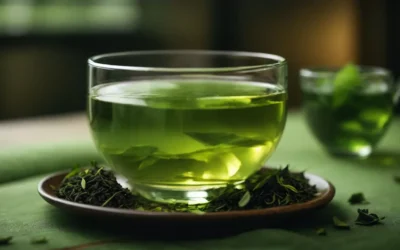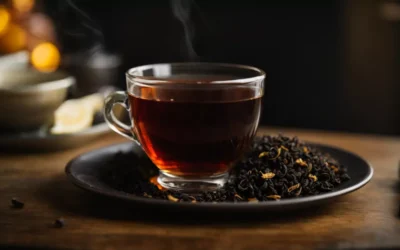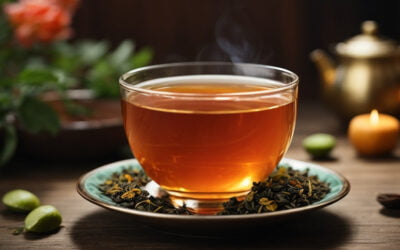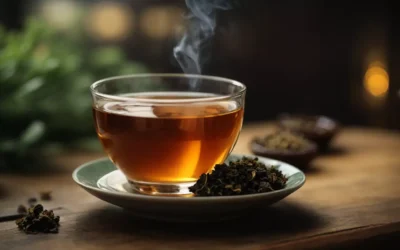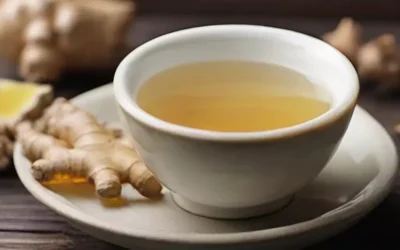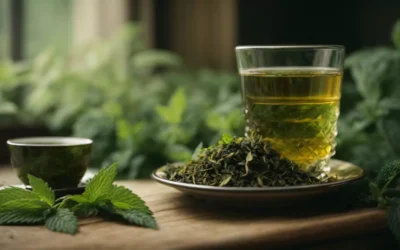Chrysanthemum tea, is a delightful cold brew beverage that not only offers a soothing and refreshing taste but also provides numerous health benefits. This flower-based tea is rich in antioxidants.
Packed with antioxidants, this tea helps combat free radicals, promoting overall well-being. The tea contains carotene and caffeine. Herbal tea, such as herbal flower tea, may aid in digestion and alleviate stomach discomfort, making it an excellent choice for those seeking digestive support. This health food is known for its antioxidant properties.
Brewing chrysanthemum tea can help reduce stress levels and promote relaxation after a long day. This antioxidant-rich tea may also have potential benefits for blood pressure.
Furthermore, the antioxidant properties of herbal flower tea may contribute to supporting joint health and its potential anti-inflammatory effects may also help in maintaining healthy blood flow. With its array of benefits and positive effects on the body, chrysanthemum tea, is a natural remedy worth considering for those looking to enhance their wellness routine. It can help improve blood circulation and overall well-being.
- Health Benefits of Chrysanthemum Tea
- How to Prepare Chrysanthemum Tea
- What Does Chrysanthemum Tea Taste Like?
- Varieties of Chrysanthemum Tea
- Other Healthy Herbal Tea Alternatives
- FAQs
Health Benefits of Chrysanthemum Tea
Chrysanthemum tea, is not just a flavorful beverage; it also offers numerous health benefits that can support your overall well-being. Additionally, this tea can help improve blood circulation. Let’s explore some of the key advantages of incorporating chrysanthemum tea into your daily routine.
Supports a Healthy Immune System
Chrysanthemum tea contains a high amount of vitamin C, which is known for its immune-boosting properties. Drinking chrysanthemum tea, which is a type of herbal flower tea, can help strengthen the immune system. This makes it more effective in fighting off infections and illnesses. By regularly consuming chrysanthemum tea, you can give your body an extra dose of this essential nutrient to help keep your immune system strong and resilient.
May Help Lower Blood Pressure and Reduce the Risk of Heart Disease
Drinking chrysanthemum tea has been associated with potential benefits for heart health. The tea contains compounds that may help lower blood pressure levels, reducing the risk of hypertension and cardiovascular diseases. Chrysanthemum tea is rich in antioxidants that can help prevent oxidative stress, inflammation, and damage to the blood vessels. These factors combined make this tea a heart-healthy choice to include in your diet.
Contains Flavonoids That Improve Eye Health
The flavonoids found in chrysanthemum tea have been linked to improved eye health. Regular consumption may help reduce the risk of age-related macular degeneration (AMD), a common eye condition that can lead to vision loss in older adults. The antioxidants present in chrysanthemum tea protect the eyes from harmful free radicals and promote healthy blood circulation to the ocular tissues.
Beneficial for Respiratory Health
If you often suffer from coughs or cold symptoms, chrysanthemum tea might be just what you need. The herbal infusion has been used for a long time as a natural remedy for respiratory issues due to its soothing properties. It can help alleviate coughs, clear congestion, and provide relief from respiratory discomfort. The tea’s anti-inflammatory properties can also help reduce inflammation in the airways, making it easier to breathe.
Promotes Weight Loss
For those aiming to shed a few pounds, chrysanthemum tea can be a helpful addition to your weight loss journey. This herbal beverage is low in calories and naturally caffeine-free, making it an excellent alternative to sugary drinks or high-calorie beverages. Chrysanthemum tea has been known to boost metabolism and aid in digestion. By incorporating this tea into your diet along with a healthy eating plan and regular exercise, you may experience enhanced weight loss results.
Chrysanthemum tea offers a range of health benefits that make it a valuable addition to your daily routine. From supporting your immune system to promoting heart health and aiding in weight loss, this herbal infusion has much to offer. So why not give it a try? Brew yourself a cup of chrysanthemum tea today and savor both its delightful taste and its potential health benefits.
Not sure where to find the best Chrysanthemum teas? Check out my article about my top 5 Chrysanthemum teas.
How to Prepare Chrysanthemum Tea
To enjoy a refreshing cup of chrysanthemum tea, follow these simple steps:
Boil Water and Add Dried Chrysanthemum Flowers or Tea Bags
Start by boiling some water in a kettle or pot. While the water is heating up, gather your dried chrysanthemum flowers or tea bags. You can easily find these at your local grocery store or specialty tea shops.
Once the water has come to a boil, carefully add the dried chrysanthemum flowers or tea bags into the pot. The amount you use will depend on how strong you prefer your tea. As a general guideline, one teaspoon of dried flowers or one tea bag per cup of water should suffice.
Steep for 5 Minutes, Then Strain the Tea into a Cup
Allow the chrysanthemum flowers or tea bags to steep in the hot water for about 5 minutes. This will allow the flavors and beneficial compounds from the flowers to infuse into the water.
After steeping, it’s time to strain the tea. Use a fine mesh strainer or a small sieve to separate the liquid from any remaining flower petals or loose leaves. Pour the strained tea into a cup, ready to be enjoyed.
Add Honey or Lemon for Extra Flavor if Desired
Chrysanthemum tea has a delicate floral flavor on its own, but if you prefer some added sweetness or tanginess, feel free to stir in some honey or squeeze in fresh lemon juice. These additions can enhance both taste and aroma while providing additional health benefits.
Honey is known for its soothing properties and can help relieve sore throats or coughs. Lemon adds a bright citrusy note that complements the floral undertones of chrysanthemum tea.
Remember that adding honey or lemon is entirely optional; it’s all about personal preference and tailoring the taste to your liking.
Serve Hot or Chilled Depending on Personal Preference
Chrysanthemum tea can be enjoyed in different ways, depending on your preference and the weather. If you’re looking for a comforting and warming drink, serve it hot. The steam rising from the cup will awaken your senses as you savor each sip.
On the other hand, if you’re seeking a refreshing and cooling beverage, chill the tea after steeping and strain it over ice cubes. This makes for a delightful thirst-quencher during hot summer days or after a workout session.
Remember to experiment with different serving temperatures to find what suits you best. Some people even enjoy chrysanthemum tea at room temperature—it’s all about finding that perfect balance for your taste buds.
What Does Chrysanthemum Tea Taste Like?
Chrysanthemum tea is known for its delicate floral aroma and slightly sweet taste. When you take a sip, you’ll be greeted with a refreshing and soothing experience that can be likened to chamomile tea but with a distinct flavor profile. The taste of chrysanthemum tea is light-bodied, offering subtle herbal notes and hints of honey-like sweetness.
Delicate Floral Aroma
One of the defining characteristics of chrysanthemum tea is its delightful floral aroma. As you bring the cup closer to your nose, you’ll be greeted by the gentle scent of blooming flowers. The fragrance is delicate yet captivating, adding an element of sensory pleasure to your tea-drinking experience.
Slightly Sweet Taste
The taste of chrysanthemum tea carries a natural sweetness that is not overpowering. It offers just the right amount of sweetness to tantalize your taste buds without overwhelming them. This subtle sweetness adds depth and complexity to the overall flavor profile, making it a pleasant choice for those who prefer a milder taste.
Refreshing and Soothing
Chrysanthemum tea has a cooling effect on the body, making it particularly refreshing on hot summer days or after intense physical activity. It has been traditionally consumed in Asian cultures as a way to combat heat and promote relaxation. The soothing properties of chrysanthemum tea can help calm your mind and provide relief from stress and anxiety.
Similarity to Chamomile Tea
If you enjoy chamomile tea, chances are you will appreciate the taste of chrysanthemum tea as well. Both teas share similar characteristics. However, while chamomile has its own distinct flavor profile, chrysanthemum tea brings its own unique set of flavors to the table.
Light-bodied with Subtle Herbal Notes
Chrysanthemum tea is light-bodied, meaning it has a delicate and smooth texture that glides effortlessly over your palate. It doesn’t feel heavy or overpowering in your mouth, allowing you to fully appreciate the nuanced flavors it offers. Alongside its floral notes, chrysanthemum tea also carries subtle herbal undertones that add depth and complexity to each sip.
Hints of Honey-Like Sweetness
In addition to its floral and herbal qualities, chrysanthemum tea boasts hints of honey-like sweetness. This natural sweetness lingers on your taste buds, providing a pleasant aftertaste that leaves you craving for more. The subtle touch of sweetness makes chrysanthemum tea an enjoyable beverage on its own or as a base for other drinks.
Versatility in Enjoyment
Chrysanthemum tea can be enjoyed plain or mixed with other herbs or teas to create unique flavor combinations. Many people like to experiment by adding ingredients such as goji berries, rock sugar, or even green tea to enhance the taste further. This versatility allows you to tailor your chrysanthemum tea experience according to your personal preferences.
Varieties of Chrysanthemum Tea
In exploring the world of chrysanthemum tea, we have discovered a variety of options available to satisfy different tastes and preferences. From delicate floral notes to earthy undertones, there is a chrysanthemum tea for everyone. Some popular varieties include:
- White Chrysanthemum Tea: This variety is made from the buds of white chrysanthemum flowers, resulting in a light and refreshing brew with subtle sweetness.
- Yellow Chrysanthemum Tea: Made from yellow chrysanthemums, this tea offers a deeper flavor profile with hints of honey and herbal notes.
- Ju Hua (Chrysanthemum) Tea: Derived from the dried flowers of Ju Hua, this tea has a milder taste compared to other varieties and is often served as a calming herbal infusion.
By exploring these different types of chrysanthemum tea, you can find the one that suits your palate best. Whether you prefer a delicate floral experience or a more robust flavor, incorporating chrysanthemum tea into your routine can be both enjoyable and beneficial for your well-being.
If you’re ready to embark on your journey with chrysanthemum tea, why not try brewing a cup today? Explore the various flavors and aromas this delightful beverage has to offer. Remember to source high-quality ingredients for an authentic experience. Cheers to discovering the wonders of chrysanthemum tea!
Other Healthy Herbal Tea Alternatives
Looking for more options to expand your herbal tea collection? Look no further! Here are some other healthy herbal teas that you can enjoy in addition to chrysanthemum tea:
Peppermint Tea
- Features: Refreshing and soothing, aids digestion
- Pros: Relieves headaches and sinus congestion, promotes relaxation
- Cons: May cause heartburn or allergic reactions in some individuals
Chamomile Tea
- Features: Calming and sleep-inducing, anti-inflammatory properties
- Pros: Reduces anxiety and promotes better sleep, eases stomach discomfort
- Cons: May cause drowsiness, may interact with certain medications
Ginseng Tea
- Features: Energizing and immune-boosting, adaptogenic properties
- Pros: Increases energy and mental alertness, supports immune function
- Cons: May cause insomnia or high blood pressure in some individuals
Dandelion Tea
- Features: Detoxifying and diuretic, rich in antioxidants
- Pros: Supports liver health, aids digestion, may help with weight loss
- Cons: May cause allergic reactions or interact with certain medications
Nettle Tea
- Features: Nutrient-rich and anti-inflammatory, supports urinary health
- Pros: Relieves seasonal allergies, promotes healthy skin, reduces joint pain
- Cons: May cause stomach upset or interact with certain medications
Jasmine Tea
- Features: Fragrant and calming, rich in antioxidants
- Pros: Reduces stress and anxiety, improves digestion, promotes heart health
- Cons: May cause allergic reactions in some individuals
Gunpowder Tea
- Features: Strong and smoky flavor, high in antioxidants
- Pros: Boosts metabolism and aids in weight loss, improves focus and alertness
- Cons: Contains caffeine, may cause insomnia or restlessness in sensitive individuals
Pu-erh Tea
- Features: Earthy and fermented, aids digestion and weight management
- Pros: Reduces cholesterol levels, supports healthy gut bacteria, may help with weight loss
- Cons: Contains caffeine, may cause insomnia or upset stomach in some individuals
Ginger Tea
- Features: Spicy and warming, anti-inflammatory properties
- Pros: Relieves nausea and digestive issues, boosts immune system
- Cons: May cause heartburn or interact with certain medications
Honeysuckle Tea
- Features: Sweet and floral, immune-boosting properties
- Pros: Soothes sore throat and cough, reduces inflammation
- Cons: May cause allergic reactions in some individuals
With these herbal tea alternatives, you can explore a variety of flavors and enjoy their unique health benefits. So go ahead, brew a cup of your favorite herbal tea and savor the goodness!
FAQs
What are the health benefits of chrysanthemum tea?
Chrysanthemum tea offers a range of health benefits. It is known to improve eye health, reduce inflammation, and boost the immune system. It can help with digestion, relieve stress and anxiety, and promote better sleep. Incorporating chrysanthemum tea into your daily routine can be a great way to support your overall well-being.
How do I prepare chrysanthemum tea?
Preparing chrysanthemum tea is a breeze! Simply steep a handful of dried chrysanthemum flowers in hot water for about 5-7 minutes. You can adjust the steeping time depending on your desired strength. Once ready, strain the flowers and enjoy the refreshing floral aroma and flavor of this delightful beverage.
Is chrysanthemum tea safe for children to consume?
Yes, chrysanthemum tea is generally safe for children to consume in moderation. However, it’s always best to consult with a pediatrician before introducing any new beverage into their diet. As with any herbal infusion or drink, it’s important to ensure that it suits their individual needs and does not interfere with any existing medical conditions or medications.
Can I drink chrysanthemum tea if I am pregnant or breastfeeding?
While there are no specific contraindications regarding chrysanthemum tea during pregnancy or breastfeeding, it is advisable to consult with your healthcare provider before consuming it regularly. They will be able to provide personalized guidance based on your unique circumstances. It’s always better to err on the side of caution.
Where can I buy high-quality chrysanthemum tea?
You can find high-quality chrysanthemum tea at various places both online and offline. Online platforms like reputable e-commerce websites often offer a wide selection of chrysanthemum tea brands. Local tea shops or health food stores may carry it as well. Ensure that you choose a trusted source and read customer reviews to ensure the quality and authenticity of the product.
Interested in trying chrysanthemum tea?
Why wait? Experience the numerous benefits of chrysanthemum tea today! Incorporate this delightful beverage into your daily routine and enjoy its refreshing taste while supporting your overall well-being. Try brewing a cup for yourself and see how it can enhance your lifestyle. Cheers to good health!

